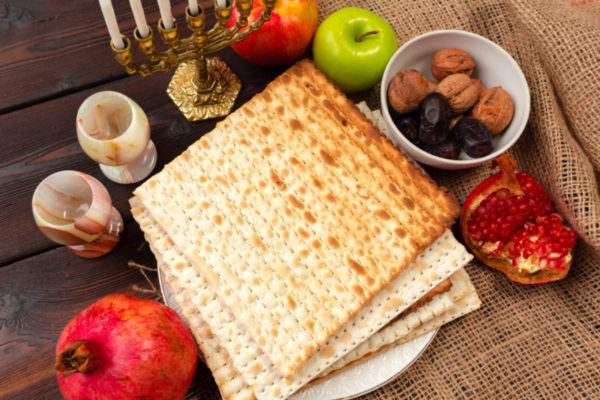As we have previously seen, the words which indicate that eating Matzah on Erev Pesah could result in one’s death by lashes, were inserted by a scribe who copied the manuscript and completed the phrase from memory, though it did not belong there.
However, for generations people believed that this is indeed the punishment, and even if they did not, the analogy in the Yerushalmi to near-incestuous relationships was scary enough to not only deter them from eating Matzah on Erev Pesah, but to make them expand the prohibition. Among the additional restrictions, not all approved by the poskim, but practiced by people nonetheless, are:
- Not eating Maror or eggs on Erev Pesah.[i]
- Not eating Hazzeret on Erev Pesah.[ii]
- Not eating any vegetables used on Pesah starting on Rosh Hodesh Nissan and also on the first day of Yom Tov, which is the eve of the second seder.[iii]
- Not eating Matzah starting on Rosh Hodesh.[iv]
- Not eating fruits on Erev Pesah and the first Yom Tov because we eat Harosset at the seder.[v]
An interesting modification was made by the Haye Adam (endnote 4 above). He writes that eating Matzah on Erev Pesah is analogous to having relations with one’s bride before the Sheva Berakhot. This is based on the statement of the Yerushalmi, but while back then the gap between betrothal and marriage was a year or two, it is now less than half an hour, and it is hard to imagine such a thing happening.
Seeing how this statement turned into a prohibition and then spiraled out of control, I believe it is imperative to excavate its roots.
To do that, we need to visit ancient Israel after the destruction of the Temple. My teacher and mentor, Professor Yitzchak Gilat, has shown that the Judea and Galilee regions differed sharply in their commitment to rituals revolving around the Temple. While common sense would have dictated that the Judeans will be more zealous in preserving the memory of the Temple, it was the opposite. The Galileans were the ones who kept Temple-related practices with greater devotion. There could be two main reasons for that:
- Historically, Judea and Jerusalem were cosmopolitan, and their inhabitants were influenced by the Greek and Roman cultures. They were more liberal, therefore, in their attitude to some practices which they considered antiquated or narrow-minded.
- Emotionally, the shock of losing the Temple was much greater for those living in its vicinity, and they therefore were the first ones to despair and give up hope of its rebuilding.
These different attitudes are reflected in the fourth chapter of Mishnah Pesahim. In Mishna 1 we read:
משנה פסחים, ד:א: מקום שנהגו לעשות מלאכה בערבי פסחים עד חצות עושין, מקום שנהגו שלא לעשות אין עושין
There are places where the Minhag is do work on Erev Pesah until midday, and there one can work, and there are places where the Minhag is not to do work, and there one is not allowed to work.
The Mishnah suggests that everybody agrees that work is forbidden after midday but does not explain what is the reason for the prohibition.
According to most commentators the reason is that one might get carried away in his work and forget to prepare for Pesah, but this is not convincing. Rabbi Shelomo Adani (Yemen-Israel, 1567-1630), in his comprehensive commentary Melekhet Shelomo, explains that the prohibition is tied to the special nature of Erev Pesah as the day of offering a sacrifice. In the time of the Temple, when a one brought a personal sacrifice, that day was considered for him or her a Yom Tov. Erev Pesah, in which every member of the nation brought a personal sacrifice, was therefore a national/individual Yom Tov.
Indeed, Erev Pesah is always referred to in the Torah as חג הפסח, while the fifteenth to the twenty-first of Nissan are called חג המצות.
After the destruction of the Temple חג הפסח, the Feast of the Pesah Sacrifice, lost some of its mean significance and status, and its memory was preserved by refraining from work on that day. Some people, however, kept working until midday, and guess who are those people –
משנה ה: ביהודה היו עושין מלאכה בערבי פסחים עד חצות ובגליל לא היו עושין כל עיקר
In Judea they would work until midday but in the Galilee they would not work all day.
This disregard to the memory of the Temple quickly evolved (or devolved) into the next phase: people were arguing that the only reason you had to wait until nightfall at the time of the Temple is that the time of the sacrifice was at nightfall, but now that there is no sacrifice, it is fine to start the Seder earlier.
We will explore this tomorrow, but meanwhile, I leave you with a riddle:
RIDDLE:
Which paragraph in the Haggadah was written as a response to those who wanted to celebrate Pesah, or the Seder, earlier?
[i] ילקוט יוסף, קצוש”ע, אורח חיים תעא:ח: יש נוהגים להחמיר שלא לאכול מרור בערב פסח… ויש נוהגים להחמיר גם שלא לאכול ביצים בערב פסח
[ii] מטה משה, עמוד העבודה, חלה:תרד: נהגו אנשי מעשה שגם אין לאכול חזרת… בערב פסח
[iii] פסח מעובין, איסור אכילה בערב פסח, קטז: …מנהג א”א ז”ל היה שלא לאכול ירקות היוצאים בהם בפסח וכרפס מר”ח ניסן ואילך… וביום א’ של פסח
[iv] חיי אדם, חלק ב-ג, כלל קכט:יג: אך יש נוהגים שלא לאכול אפי’ מראש חודש, והאוכל מצה בערב פסח, כאילו בא על ארוסתו קודם שבירך ז’ ברכות
[v] שולחן ערוך הרב, אורח חיים, סימן תעא: יש נוהגין להחמיר עוד שלא לאכול פירות בערב פסח או ביום ראשון של פסח כדי לאכול חרוסת בלילה לתיאבון





Ohr HaChaim Yomi – Emor